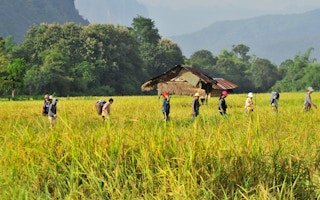The world’s food system is at risk. Extreme weather patterns continue to undermine agrifood production. A report published by the Food and Agriculture Organization (FAO) in 2021 suggests that current agricultural production is overloading the sustainability limits of land and water resources. To tackle these challenges, many academics and international organisations have suggested that sustainable agricultural practices, such as the use of organic inputs, integrated farming and the promotion of biodiversity in farmlands, can be used to improve climate resilience in agricultural production.
In Southeast Asia, many farming groups have been experimenting with sustainable agriculture for decades. Fast transitions to climate-resilient agriculture, however, requires an “all-hands-on-deck” approach, and other actors in Southeast Asia should think of innovative ways to help support sustainable agriculture as well as small- and medium-scale farmers generally.
Many tourism enterprises in Laos and Thailand, for example, have been helping to promote sustainable agriculture in various ways. In Laos, eco- and agritourism are becoming more popular. Some farms have used profits from tourism to support other activities relating to the promotion of sustainable agriculture, such as training for farmers and development of local green markets. A good example is Phutawen Farm near Vientiane which provides visitors with many outdoor activity options in addition to farm tours and sales of organic produce.
A study published by the Asian Development Bank (ADB) in 2021 also suggests that the rapidly growing tourism industry in Laos can be used to support sustainable farming. Hotels and restaurants, for example, may commit themselves to purchasing local organic products and then use this as their selling point. A pre-Covid survey conducted by the ADB in 2019 suggests that 20 per cent of tourism enterprises in Laos reportedly made organic produce purchases, and 60 per cent of them also advertised this to their customers. Although the majority (90 per cent) of the enterprises surveyed were interested in buying organic produce, the main problems they faced included the lack of supply and higher prices of organic products. There are many competing organic labels in the market, but some of them might not strictly follow organic standards. The Laotian government, however, recognises Laos’ comparative advantage in organic agriculture and aims to establish local organic markets in all provinces. To ensure quality, the government plans to expand participatory guarantee systems (PGS) across the country. Such systems are low-cost and locally-based systems of quality assurance, with mutually-supporting stakeholders helping farmers to produce according to certain organic food standards. Interestingly, the same ADB survey suggests that, with the exception of Luang Prabang, average prices of organic vegetables in Laos are not significantly higher than those grown by conventional methods.
In Thailand, there are hotels and resorts that are actively promoting sustainable agriculture. At Suan Sampran resort in Nakhon Pratom province, for example, visitors can take a tour of certified organic farms as well as purchase sustainably-sourced food and spa products. Suan Sampran trains local farmers and is committed to finding markets for sustainable farmers in the network. To date, it has built partnerships with universities, government agencies, local authorities and around 177 organic farmers.
Another interesting example is Chumphon Cabana Resort and Diving Centre in southern Thailand. It has, for around two decades, been a well-known knowledge-sharing hub that experiments with sustainable agriculture methods. To save the resort from being auctioned off by a debt management company in 2013, public crowd-funding started by the Thamturakit social enterprise raised 130 million Thai baht (US$4 million) from around 13,000 people to purchase the resort. Profits from the resort now help to fund Thamturakit’s activities, which include training farmers in sustainable agriculture techniques and providing markets for around 200-300 farmers. One of Thamturakit’s founders also runs the Pun Pun center in Chiang Mai. It trains farmers to become self-reliant in sustainable agriculture, as well as to save and distribute indigenous seeds. Revenues from Pun Pun’s restaurant and the sales of processed food products help to make it financially self-reliant.
There are also other businesses in Thailand that help to promote sustainable agriculture even though their products and services are not directly related to the agricultural sector. TV Burapha, for example, is an educational media channel that has helped the Moral Rice Network to market its organic rice. Another example is Suan Nguen Mee Ma social enterprise – a book publisher that also sells green products in their bookstore. Suan Nguen Mee Ma also runs a green market network and works with international partners to promote organic agriculture in Asia. Naiin bookstores, with outlets throughout the country, also help to promote the distribution of sustainable agrifood products by putting organic rice on their shelves.
The most straightforward way that businesses can help to support sustainable agriculture in Southeast Asia is by purchasing locally- or regionally-produced sustainable agrifood products at prices that are fair to both producers and consumers. The case for sustainable agriculture is indisputable, but the reality is that adoption rates are low. The reasons range from the lack of knowledge, the difficulty of adopting less conventional and sustainable methods, and the amount of man-hours of labour required.
Given the climate change challenge, however, more can be done. Through marketing efforts, businesses can also help to raise consumer awareness about the importance of sustainable and climate-resilient agriculture. Given that the world’s food system is at risk due to climate change, Southeast Asian governments cannot leave this issue entirely in the hands of the private sector. Governments should integrate the production of sustainable agriculture into national plans, commit to public procurement of sustainably produced food. They should also encourage further collaboration between tourism associations and sustainable food producer networks. From restaurants to hotels and beyond, everyone has a stake in ensuring food sustainability in a climate-changing world.
Prapimphan Chiengkul is visiting fellow with the Climate Change in Southeast Asia Programme, ISEAS – Yusof Ishak Institute.
This article was first published by ISEAS – Yusof Ishak Institute as a Fulcrum commentary.











